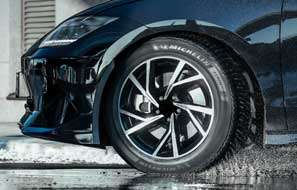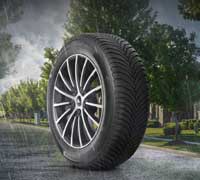 French tyre maker Michelin says it supports the new European regulation R117-04 on the performance of new car tyres once worn, which has been enforced in July 2024. It allows for guaranteeing better safety on the roads, and also for solving the issues of protecting both the planet and the purchasing power of European motorists.
French tyre maker Michelin says it supports the new European regulation R117-04 on the performance of new car tyres once worn, which has been enforced in July 2024. It allows for guaranteeing better safety on the roads, and also for solving the issues of protecting both the planet and the purchasing power of European motorists.
· This new European provision includes a stringent statutory test that allows for improving road safety while encouraging motorists to rely on trusted tyres, right down to the legal tread depth of 1.6 mm. According to a Michelin study, 50% of tyres are removed before reaching a residual depth of 3 mm. On a global scale, 400 million tyres are scrapped prematurely every year, it adds.
The wet braking test adopted by the European authorities measures the distance required for a vehicle to decelerate from 80 to 20 km/per/hour on a standard road surface with a water height of 1 mm. In addition to these specific points, this test includes other precise parameters, such as the road grip coefficient or the ambient temperature. The tests on wet ground are already in force for defining the safety threshold of new tires according to the regulations and are widely recognised by the tyre industry. They also meet the more extreme situations that a motorist may encounter on the road.
 Designing tires that perform from the first to the last mile is in Michelin’s DNA and stems from a design choice made by the group, with one aim: user safety. For example, when stopping on wet ground, a worn Michelin tyre designed to maintain its performances over time can brake on average 3.4 m shorter than a new competitor tyre, it claims. This distance represents approximately one car length, a few meters that are crucial in an emergency.
Designing tires that perform from the first to the last mile is in Michelin’s DNA and stems from a design choice made by the group, with one aim: user safety. For example, when stopping on wet ground, a worn Michelin tyre designed to maintain its performances over time can brake on average 3.4 m shorter than a new competitor tyre, it claims. This distance represents approximately one car length, a few meters that are crucial in an emergency.
The application of this regulation will influence the demand for new tyres in Europe, which could be reduced by 128 million units/year, leading to a reduction in CO2 emissions of approximately 6.6 million tonnes. On a global scale, 400 million tyres/year are removed prematurely, and 35 million tonnes of CO2 could therefore be saved, i.e., the emissions of a city like New York for six months, according to Michelin.
Keeping tyres for longer will also allow for protecting consumers’ purchasing power. This means nearly EUR7 billion that could be saved by European motorists every year, says the French firm.
Search for Yokohama logo on building
